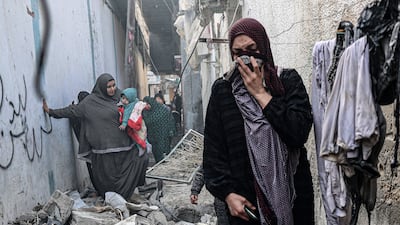Live updates: Follow the latest news on Israel-Gaza
Israel’s army is planning a new displacement of Palestinian civilians in Gaza, Prime Minister Benjamin Netanyahu's office said on Monday, following his announcement that a ground invasion of the southern city of Rafah was necessary.
Israel's military “presented the war cabinet with a plan for evacuating the population from the areas of fighting in the Gaza Strip, and with the upcoming operational plan”, said the statement by Mr Netanyahu's office.
It did not give any details about how or where civilians would be moved and which areas would be affected by the operation.
Currently, nearly 1.5 million Palestinians who fled northern and central areas of the coastal enclave are sheltering in the southern city, where Israeli troops are yet to enter. It is also the entry point for desperately needed aid, brought in via neighbouring Egypt.
The statement said that a plan was approved for “providing humanitarian assistance to Gaza in a manner that will prevent the looting that has occurred in the northern strip and other areas”.
Mr Netanyahu told US broadcaster CBS on Sunday that the Palestinians sheltering in the south of Gaza would be told to move to the north of the strip – much of which has been already devastated by the Israeli air and ground offensive.
“There’s room for them to go north of Rafah to the place that we’ve already finished fighting in,” Mr Netanyahu said, but also noted hostilities were still going on “in the northern part”.
The Israeli leader said a ground invasion of Rafah would put Israel within weeks of “total victory” over Hamas, whose October 7 attack on southern Israel triggered the war.
“If we have a [pause in fighting] deal, it will be delayed somewhat, but it will happen,” he said.
“It has to be done because total victory is our goal and total victory is within reach – not months away, weeks away, once we begin the operation.”
The international community has voiced concern about a possible Rafah invasion and some have advised Israel against it.
US National Security Adviser Jake Sullivan said that President Joe Biden's administration had made it clear that all parties need to make every effort towards reaching a temporary pause in fighting.
“We are telling everyone, including the Israeli government, that it is our firm position that every effort be exercised to get to this agreement, and then we can move forward from there,” Mr Sullivan said late on Sunday.
Much of Gaza has been devastated by Israeli air and ground bombardments since October, and most of the million or more civilians now sheltering in Rafah were moved from areas in the north.

'Where should I go?'
Raed Abu Hashem, a 39-year-old resident of Rafah city, has provided shelter to more than 100 displaced relatives. He refuses to leave his home despite warnings of an Israeli military operation.
“Where should I go, along with the 100 people I'm hosting? I've seen what happened to the residents in the north of Gaza when they left their homes, they lost everything,” Mr Abu Hashem told The National.
“We are struggling to provide water and food while staying in our homes. What could happen if we left to stay in tents?”
Abu Alaa Al Kteeb, a 70-year-old resident of the southern city, says he is willing to risk dying in his home rather than flee to an unknown destination.
70-year-old Rafah resident
“They are displacing us and making us scavenge for food and a dignified life,” Mr Al Kteeb told The National.
“For me, I am not leaving my home. Even if my sons and their children want to leave, I will not abandon it and return to find it destroyed. I would rather die than live to see the destruction of what remains of my home,” he said.
Mr Al Kteeb said Palestinians should not follow the Israeli's instructions after what happened in Khan Younis and Gaza city.
He has hope that if civilians refuse to leave, then a military operation will not be conducted, he said.
Mahmoud Al Hinawi, 42, from Beit Lahia in the north of Gaza, has already been displaced several times – from the north to central Gaza, then to Khan Younis in the south, and finally to Rafah, where he now lives in a tent.
“If they ask us to flee, it will be for the fifth time, and it's always into the unknown. What I desire now is for my fifth displacement to be to the north so we can return to our destroyed homes,” Mr Al Hinawi told The National.
“We will not agree to flee to another destination in the south. Let us go back to our homes and start rebuilding the lives they completely destroyed,” he said.

